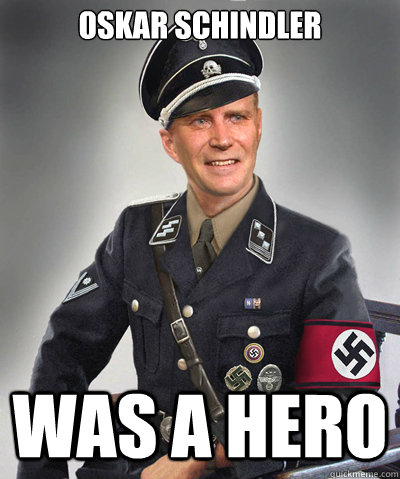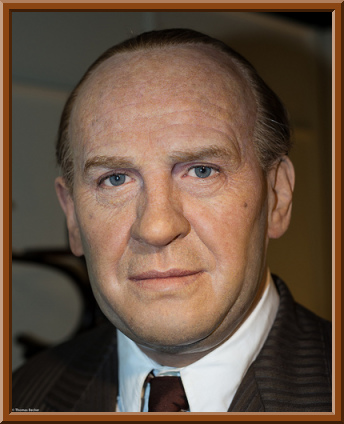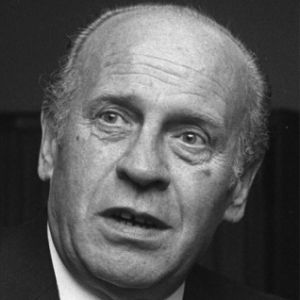


at age 66.
|
|
Oskar Schindler was an unlikely World War II hero: a member of the Nazi Party who spied for Germany, a businessman always looking for an angle, and a husband who strayed and drank to excess.
But his legacy is great. More than 7,000 people are alive today who are directly descended from the more than 1,000 Jews whom Schindler saved from near-certain death in Nazi concentration camps. He employed these prisoners in his factories, risking his life by telling lies and bribing German officers. Schindler was "an unlikely hero,” notes his biography at the U.S. Holocaust Memorial Museum website, transforming from “a Nazi war profiteer to protector of Jews.” His story was largely unknown until the release of the 1993 Steven Spielberg film Schindler's List. Born April 28, 1908, Schindler joined the Nazi Party in 1939 and worked for the Nazi intelligence-gathering organization in Poland and Czechoslovakia. Later, those connections would help him save lives. In 1939, Schindler acquired an enamelware factory in Poland where about 1,000 of the 1,700 workers were Jews. Schindler began his rescue as a way to make extra money. "But as time went on, he grew to care about his Jewish workers, particularly those with whom he came into contact on a daily basis. In addition, helping Jews became a way to fight against what he viewed as disastrous and brutal policies emanating from Adolf Hitler and the SS," according to a review on Forbes.com of David Crowe’s Oskar Schindler: The Untold Account of His Life, Wartime Activities and the True Story Behind The List. Schindler had convinced Nazi leaders that his business was essential to the war efforts, and "he used this advantage hiring Jews he claimed necessary to keep the business running. He was not beyond falsifying papers, listing children, housewives and lawyers as expert mechanics to disguise unqualified workers," according to the website Teaching the Holocaust With Primary Sources. The Eastern Illinois University site provides Holocaust-teaching guidelines for educators. "He bribed guards and SS officials willingly to provide better treatment for his workers. The entire time that Schindler's ammunition plant was operational, it only produced one load of live ammunition. The rest was faulty." As German military leaders realized they were losing the war, the extermination of Jews was deemed a priority. Schindler convinced SS leaders that he should be allowed to move his factory and his workers to an area far from the gas chambers. He also asked that he be allowed to make armaments, thus allowing him to argue that his Jewish workers were essential to the war effort. The plant "produced just one wagonload of live ammunition in just under eight months of operation. By presenting bogus production figures, Schindler justified the existence of the sub-camp as an armaments factory and thus facilitated the survival of over 1,000 Jews," according to the U.S. Holocaust Memorial Museum website.  In the fall of 1944, Schindler moved his armaments factory to Brunnlitz. “Oskar could easily have closed his Krakow operations and retreated westward with the profits he had already made,” Crowe wrote. “Instead, he chose to risk his life and his money to save as many Jews as he could.” There are dozens of stories of Schindler's kindness. Moshe Rosenberg was a teenager when he was sent to the camps. In his book The Boys: Triumph Over Adversity, writer Martin Gilbert describes how the 16-year-old Rosenberg was whipped one day for taking a rest during road building. Schindler came upon the beating and told the guards he would personally take care of the lazy worker. “Without him stepping in, the guards would have beaten me until I was dead," Rosenberg recalled. Later, Rosenberg went to work in Schindler's factory. He was seated one day when Schindler came to the floor with an SS commander. Schindler ran to him, grabbed his jacket and slapped his face, shouting, “‘Get back to work!'” Rosenberg said. “It was an act. Schindler never hit anyone or raised his voice. If (the SS leader) had found me sitting down he would have shot me on the spot." After the war, Schindler moved to South America, then returned to Germany where he died in October 1974 at age 66, penniless and largely unknown. But the people he saved, the so-called Schindlerjuden, or “Schindler Jews,” did not forget. They paid for his body to be buried in Jerusalem as he had wanted, because "My children are here." Even today, the Schindlerjuden do not forget. In a 2013 article in Maryland's Frederick News-Post, survivor Halina Silber described how she was assigned to work in one of Schindler's factories when she was 12 years old and separated from her family. "Schindler, with his kindness, gave us help … and most important, he gave us our dignity," she said. "For us, he was an angel sent by God to save us."  |
|

